警察与赞美诗原文
欧·亨利《警察和赞美诗》原文和译文
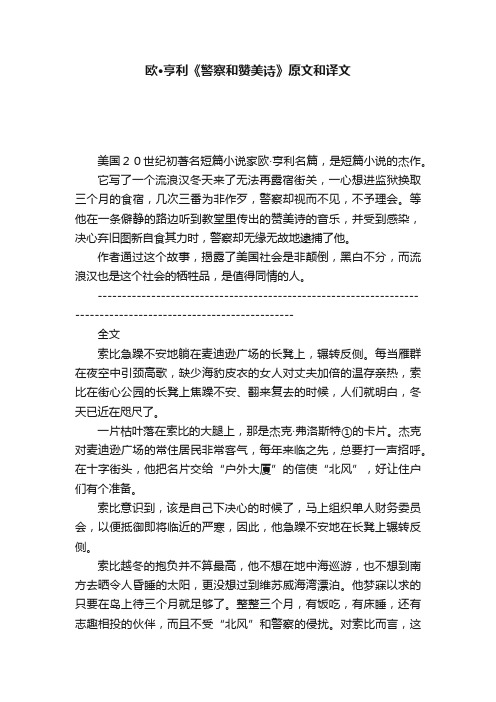
欧·亨利《警察和赞美诗》原文和译文美国20世纪初著名短篇小说家欧·亨利名篇,是短篇小说的杰作。
它写了一个流浪汉冬天来了无法再露宿街关,一心想进监狱换取三个月的食宿,几次三番为非作歹,警察却视而不见,不予理会。
等他在一条僻静的路边听到教堂里传出的赞美诗的音乐,并受到感染,决心弃旧图新自食其力时,警察却无缘无故地逮捕了他。
作者通过这个故事,揭露了美国社会是非颠倒,黑白不分,而流浪汉也是这个社会的牺牲品,是值得同情的人。
---------------------------------------------------------------------------------------------------------------全文索比急躁不安地躺在麦迪逊广场的长凳上,辗转反侧。
每当雁群在夜空中引颈高歌,缺少海豹皮衣的女人对丈夫加倍的温存亲热,索比在街心公园的长凳上焦躁不安、翻来复去的时候,人们就明白,冬天已近在咫尺了。
一片枯叶落在索比的大腿上,那是杰克·弗洛斯特①的卡片。
杰克对麦迪逊广场的常住居民非常客气,每年来临之先,总要打一声招呼。
在十字街头,他把名片交给“户外大厦”的信使“北风”,好让住户们有个准备。
索比意识到,该是自己下决心的时候了,马上组织单人财务委员会,以便抵御即将临近的严寒,因此,他急躁不安地在长凳上辗转反侧。
索比越冬的抱负并不算最高,他不想在地中海巡游,也不想到南方去晒令人昏睡的太阳,更没想过到维苏威海湾漂泊。
他梦寐以求的只要在岛上待三个月就足够了。
整整三个月,有饭吃,有床睡,还有志趣相投的伙伴,而且不受“北风”和警察的侵扰。
对索比而言,这就是日思夜想的最大愿望。
多年来,好客的布莱克韦尔岛②的监狱一直是索比冬天的寓所。
正像福气比他好的纽约人每年冬天买票去棕榈滩③和里维埃拉④一样,索比也要为一年一度逃奔岛上作些必要的安排。
现在又到时候了。
昨天晚上,他睡在古老广场上喷水池旁的长凳上,用三张星期日的报纸分别垫在上衣里、包着脚踝、盖住大腿,也没能抵挡住严寒的袭击。
警察与赞美诗 中英文剧本
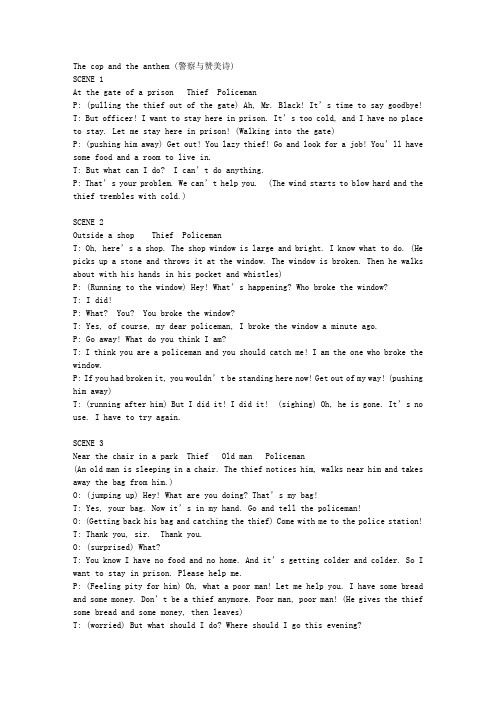
The cop and the anthem (警察与赞美诗)SCENE 1At the gate of a prison Thief PolicemanP: (pulling the thief out of the gate) Ah, Mr. Black! It’s time to say goodbye! T: But officer! I want to stay here in prison. It’s too cold, and I have no place to stay. Let me stay here in prison! (Walking into the gate)P: (pushing him away) Get out! You lazy thief! Go and look for a job! You’ll have some food and a room to live in.T: But what can I do? I can’t do anything.P: That’s your problem. We can’t help you. (The wind starts to blow hard and the thief trembles with cold.)SCENE 2Outside a shop Thief PolicemanT: Oh, here’s a shop. The shop window is large and bright. I know what to do. (He picks up a stone and throws it at the window. The window is broken. Then he walks about with his hands in his pocket and whistles)P: (Running to the window) Hey! What’s happening? Who broke the window?T: I did!P: What? You? You broke the window?T: Yes, of course, my dear policeman, I broke the window a minute ago.P: Go away! What do you think I am?T: I think you are a policeman and you should catch me! I am the one who broke the window.P: If you had broken it, you wouldn’t be standing here now! Get out of my way! (pushing him away)T: (running after him) But I did it! I did it! (sighing) Oh, he is gone. It’s no use. I have to try again.SCENE 3Near the chair in a park Thief Old man Policeman(An old man is sleeping in a chair. The thief notices him, walks near him and takes away the bag from him.)O: (jumping up) Hey! What are you doing? That’s my bag!T: Yes, your bag. Now it’s in my hand. Go and tell the policeman!O: (Getting back his bag and catching the thief) Come with me to the police station! T: Thank you, sir. Thank you.O: (surprised) What?T: You know I have no food and no home. And it’s getting colder and colder. So I want to stay in prison. Please help me.P: (Feeling pity for him) Oh, what a poor man! Let me help you. I have some bread and some money. Don’t be a thief anymore. Poor man, poor man! (He gives the thief some bread and some money, then leaves)T: (worried) But what should I do? Where should I go this evening?SCENE 4In a Restaurant Thief WaitressW: Good morning, sir! T: Good morning!W: Sit down, please. Here’s the menu. What will you have?T: At first, I’d like a bowl of vegetable soup.W: (writing down) A bowl of vegetable soup.T: Then I’ll have some steak and chicken. At last, I’ll have a cup of coffee and a cigar.W: Steak, chicken, coffee and a cigar. Er, excuse me, but this is a very big meal. Do you have enough money?T: What?! What did you say? Do you often ask such questions?W: I’m sorry. I’ll bring your food right away.(Later, the thief eats up all his food)W: Was everything all right, sir?T: The food was very nice. I like it very much.W: Thank you, sir. Here’s your bill, sir. Twenty dollars, please.T: Very well, but now, I want to tell you that I haven’t twenty dollars. I don’t even have forty cents.W: I see, will you come with me, please?T: (standing up and following the waitress) Of course. The policeman is waiting for me, isn’t he?(Two men appear suddenly and walk to the thief)T: I… I… don’t understand. Who are they?)“We are the people you are waiting for!”(They give the thief a good beating.)SCENE 5In front of a church Thief Policeman Blind man(The thief stands outside of the church and listens to the music of “Silent Night”) T: What beautiful music! I often listened to it when I was a boy. Ah! How different my life is! But look at me now! What am I? Who am I? Oh, I don’t want to be a thief!I want to be a good man now. I’m not old. I’m going to work. I can help the others.(A blind man appears. The thief helps him walk across the street.)B: It’s very kind of you. (A lady drops her purse. The thief picks it up and gives it back to her.)(Later, a policeman comes)P: Hey! You! What are you doing here?T: Nothing, just listening to the music.P: Listening to the music?T: Yes, I’m just standing here and listening to the music.P: Oh, no. Didn’t I see you this morning? Of course! You are the one who was standing near that broken window. I think you broke the window after all!(The thief runs away quickly. Two other policemen run after him and catch him by thearm.T: (shouting desperately) But officer! I’ not a thief now! I don’t want to be a thief any more! I’m a good man now! I’m a good man!(The music of “silent night” echoes on the stage.)警察与赞美诗第一幕出场人物:索比 Soapy(索比急躁不安地躺在麦迪逊广场的长凳上,辗转反侧。
警察与赞美诗英语原文分析
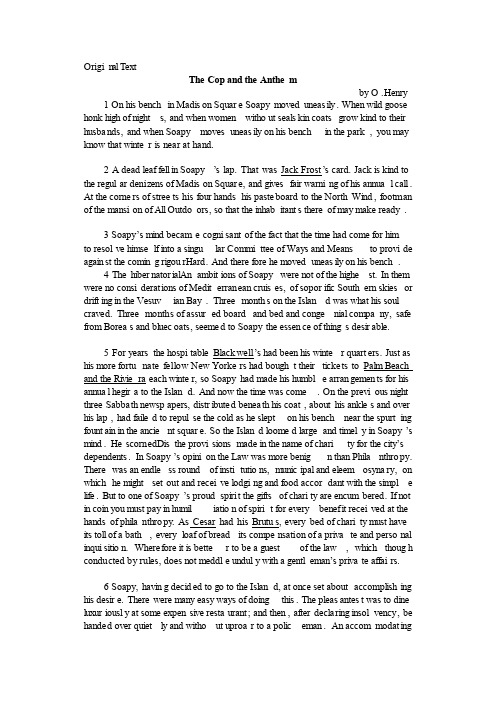
Origin al TextThe Cop and the Anthemby O .Henry1 On his benchin Madiso n Square Soapymoveduneasi ly. When wild goosehonk high of nights, and when womenwithou t sealsk in coatsgrow kind to theirhusban ds, and when Soapymovesuneasi ly on his benchin the park, you may know that winter is near at hand.2 A dead leaf fell in Soapy’slap.ThatwasJack Frost’s card. Jack is kind to the regula r denize ns of Madiso n Square, and givesfair warnin g of his annual call. At the corner s of street s his four handshis pasteb oardto the NorthWind, footma n of the mansio n of All Outdoo rs, so that the inhabi tants thereof may make ready.3 Soapy’smindbecame cognis ant of the fact that the time had come for himto resolv e himsel f into a singul ar Commit tee of Ways and Meansto provid e agains t the coming rigour Hard. And theref ore he moveduneasi ly on his bench.4 The hibern atori alAnambiti ons of Soapywere not of the highes t. In them were no consid erati ons of Medite rrane an cruise s, of sopori fic Southe rn skiesor drifti ng in the Vesuvi an Bay. Threemonths on the Island was what his soul craved. Threemonths of assure d boardand bed and congen ial compan y, safe from Boreas and blueco ats, seemed to Soapythe essenc e of things desira ble.5 For yearsthe hospit ableBlackw ell’shadbeenhiswinter quarte rs. Just as his more fortun ate fellow New Yorker s had bought theirticket s to Palm Beachand the Rivier a each winter, so Soapyhad made his humble arrang ement s for his annual hegira to the Island. And now the time was come. On the previo us nightthreeSabbat h newspa pers, distri buted beneat h his coat, abouthis ankles and over his lap, had failed to repuls e the cold as he slepton his benchnear the spurti ng founta in in the ancien t square. So the Island loomed largeand timely in Soapy’smind. He scorne dDisthe provis ionsmade in the name of charit yforthecity’sdepend ents.In Soapy’sopinio n the Law was more benign than Philan throp y. Therewas an endles s roundof instit ution s, munici pal and eleemo synar y, on whichhe mightset out and receiv e lodgin g and food accord ant with the simple life. But to one of Soapy’sproudspirit the giftsof charit y are encumb ered. If not in coin you must pay in humili ation of spirit for everybenefi t receiv ed at the handsof philan throp y. As Cesarhad his Brutus, everybed of charit y must have its toll of a bath, everyloaf of breadits compen satio n of a privat e and person al inquis ition. Wheref ore it is better to be a guestof the law, whichthough conduc ted by rules, does not meddle unduly with a gentle man’sprivat e affair s.6 Soapy,having decide d to go to the Island, at once set aboutaccomp lishi ng his desire. Therewere many easy ways of doingthis. The pleasa ntest was to dine luxuri ously at some expens ive restau rant; and then, afterdeclar ing insolv ency, be handed over quietl y and withou t uproar to a police man. An accomm odati ngmagist ratewoulddo the rest.7 Soapyleft his benchand stroll ed out of the square and across the levelsea of asphal t, whereBroadw ay and FifthAvenue flow togeth er. Up Broadw ay he turned, and halted at a glitte ringcafé, whereare gather ed togeth er nightl y the choice st produc ts of the grape, the silkwo rm and the protop lasm.8 Soapyhad confid encein himsel f from the lowest button of his vest upward. He was shaven, and his coat was decent and his neat black,ready-tied four-in-hand had been presen ted to him by a lady missio naryon Thanks givin g Day. If he couldreacha tablein the restau rantunsusp ected, succes s wouldbe his. The portio n of him that wouldshow abovethe tablewouldraiseno doubtin the waiter’smind. A roaste d mallar d duck, though t Soapy,wouldbe aboutthe thing—with a bottle of Chabli s, and then Camemb ert, a demi-tasseand a cigar. One dollar for the cigarwouldbe enough. The totalwouldnot be so high as to call forthany suprem e manife stati on of reveng e from the café manage ment; and yet the meat wouldleavehim filled and happyfor the journe y to his winter refuge.9 But as Soapyset foot inside the restau rantdoor the head waiter’seyefellupon his frayed trouse rs and decade nt shoes. Strong and readyhandsturned him aboutand convey ed him in silenc e and hasteto the sidewa lk and averte d the ignobl e fate of the menace d mallar d.10 Soapyturned off Broadw ay. It seemed that his routeto the covete d island was not to be an epicur ean one. Some otherway of enteri ng limbomust be though t of.11 At a corner of SixthAvenue electr ic lights and cunnin gly displa yed waresbehind plate-glassmade a shop window conspi cuous. Soapytook a cobble-stoneand dashed it throug h the glass.People came runnin g roundthe corner, a police man in the lead. Soapystoodstill, with his handsin his pocket s, and smiled at the sightof brassbutton s.12 “Where’sthemanthatdonethat?”inquir ed the office r excite dly.13 “Don’t you figure out that I mighthave had someth ing to do with it?”said Soapy, not withou t sarcas m, but friend ly, as one greets good fortun e.14 The police man’smindrefuse d to accept Soapyeven as a clue. Men who smashwindow s do not remain to parleywiththelaw’sminion s. They take to theirheels. The police man saw a man halfwa y down the blockrunnin g to catcha car. With drawnclub he joined in the pursui t. Soapy,with disgus t in his heart, loafed along, twiceunsucc essfu l.15 On the opposi te side of the street was a restau rantof no greatpreten sions. It catere d to largeappeti tes and modest purses. Its crocke ry and atmosp herewere thick;its soup and napery thin. Into this placeSoapytook his accusi ve shoesand tell-tale trouse rs withou t challe nge. At a tablehe sat and consum ed beefst eak, flap-jacks, doughn uts, and pie. And then to the waiter he betray ed the fact that the minute st coin and himsel f were strang ers.16 “Now,g et busy and call a cop,”saidSoapy.“Anddon’tkeepagentle manwaitin g.”16 “Nocopforyouse,”saidthewaiter, with a voicelike butter cakesand an eye like the cherry in a Manhat tan cockta il.“Hey,Con!”17 Neatly upon his left ear on the callou s paveme nt two waiter s pitche d Soapy. He arose, jointby joint, as a carpen ter’sruleopens, and beat the dust from his clothe s. Arrest seemed but a rosy dream.The Island seemed very far away. A police man who stoodbefore a drug storetwo doorsaway laughe d and walked down the street.18 Five blocks Soapytravel led before his courag e permit ted him to woo captur e again.This time the opport unity presen ted what he fatuou sly termed to himsel fa“cinch.” A youngwomanof a modest and pleasi ng guisewas standi ng before a show window gazing with sprigh tly intere st at its displa y of shavin g mugs and inksta nds, and two yardsfrom the window a largepolice man of severe demean our leaned agains t a water-plug.19 It was Soapy’sdesign to assume the rule of the despic ableand execra ted “masher.”Therefine d and elegan t appear anceof his victim and the contig uityof the consci entio us cop encour agedhim to believ e that he wouldsoon feel the pleasa nt offici al clutch upon his arm that wouldensure his winter quarte rs of the rightlittle, tightlittle isle.20 Soapystraig htene d the lady missio nary’sready-made tie, dragge d his shrink ing cuffsinto the open, set his hat at a killin g cant and sidled toward the youngwomen. He made eyes at her, was takenwith sudden coughsand“hems,”smiled, smirke d, and went brazen ly throug h the impude nt and contem ptibl e litany ofthe“masher.”With half an eyeAcSoapysaw that the police man was watchi ng him fixedl y. The youngwomanmovedaway a few steps, and againbestow ed her absorb ed attent ion upon the shavin g mugs. Soapyfollow ed, boldly steppi ng to her side, raised his hat and said: “Ahthere, Bedeli a!Don’tyouwanttocomeandplayinmyyard?”21 The police man was stilllookin g. The persec utedyoungwomanhad but to beckon a finger and Soapywouldbe practi cally en routefor his insula r haven. Alread y he imagin ed he couldfeel the cosy warmth of the statio n-house.The youngwomanfacedhim and, stretc hingout a hand, caught Soapy’scoatsleeve.22 “Sure, Mike,”shesaidjoyful ly, “ifyou’llblowmetoapailofsuds. I’dhave spoketo you sooner, but the cop was watchi ng.”With the youngwomanplayin g the clingi ng ivy to his oak Soapywalked past the police man overco me with gloom. He seemed doomed to libert y.23 At the next corner he shookoff his compan ion and ran. He halted in the distri ct whereby nightare foundthe lighte st street s, hearts, vows, and libret tos. Womenin furs and men in greatc oatsmovedgailyin the wintry air. A sudden fear seized Soapythat some dreadf ul enchan tment had render ed him immune to arrest. The though t brough t a little of panicupon it, and when he came uponanothe r police man loungi ng grandl y in frontof a transp lende nt theatr e he caught at the immedi ate strawof“disord erlyconduc t.”24 On the sidewa lk Soapybeganto yell drunke n gibber ish at the top of his harshvoice. He danced, howled, raved, and otherw ise distur bed the welkin.25 The police man twirle d his club, turned his back to Soapyand remark ed toa citize n: “Tiso ne of them Yale lads celebr atin’thegooseegg they give to the Hartfo rd Colleg e. Noisy; but no harm. We’veinstru ction stolavethembe.”26 Discon solat e, Soapyceased his unavai lingracket. Wouldnevera police man lay handson him? In his fancythe Island seemed an unatta inabl e Arcadi a. He button ed his thin coat agains t the chilli ng wind.27 In a cigarstorehe saw a well-dresse d man lighti ng a cigarat a swingi ng light.His silk umbrel la he had set by the door on enteri ng. Soapysteppe d inside, secure d the umbrel la and saunte red off with it slowly. The man at the cigarlightfollow ed hastil y.28 “Myumbrel la,”hesaidsternl y.29 “Oh, is it?”sneere d Soapy,adding insult to petitlarcen y.“Well, why don’tyoucallapolice man? I took it. Your umbrel la! Whydon’tyoucallacop? Therestands one on the corner.”30 The umbrel la ownerslowed his steps.Soapydid likewi se, with a presen timen t that luck wouldrun agains t him. The police man looked at the two curiou sly.31“Ofcourse,”saidtheumbrel la man—“thatis—well, you know how thesemistak es occur—I—ifit’syourumbrel laIhopeyou’llexcuse me—I picked it up this mornin g in a restau rant—If you recogn ise it as yours, why—Ihopeyou’ll—“32 “Ofcourseit’smine,”saidSoapyviciou sly.33 The ex-umbrel la man retrea ted. The police man hurrie d to assist a tall blonde in an operacloakacross the street in frontof a street car that was approa ching two blocks away.34 Soapywalked eastwa rd throug h a street damage d by improv ement s. He hurled the umbrel la wrathf ullyinto an excava tion.He mutter ed agains t the men who wear helmet s and carryclubs.Becaus e he wanted to fall into theirclutch es, they seemed to regard him as a king who coulddo no wrong.35 At length Soapyreache d one of the avenue s to the east wherethe glitte r and turmoi l was but faint. He set his face down this toward Madiso n Square, for the homing instin ct surviv es even when the home is a park bench.36 But on an unusua lly quietcorner Soapycame to a stands till. Here was an old church, quaint and rambli ng and gabled. Throug h one violet-staine d window a soft lightglowed, where,no doubt,the organi st loiter ed over the keys, making sure of his master y of the coming Sabbat h anthem. For theredrifte d out to Soapy’searssweetmusicthat caught and held him transf ixedagains t the convol ution s of the iron fence.37 The moon was above,lustro us and serene; vehicl es and pedest rains were few; sparro ws twitte red sleepi ly in the eaves—for a little whilethe scenemighthave been a countr y church yard.And the anthem that the organi st played cement ed Soapyto the iron fence,for he had knownit well in the days when his life contai ned such things as mother s and rosesand ambiti ons and friend s and immacu latethough ts and collar s.38 The conjun ction of Soapy’srecept ive stateof mind and the influe ncesaboutthe old church wrough t a sudden and wonder ful change in his soul. He viewed with swifthorror the pit into whichhe had tumble d, the degrad ed days, unwort hy desire s, dead hopes,wrecke d facult ies, and base motive s that made up his existe nce.39 And also in a moment his heartrespon ded thrill ingly to this novelmood. An instan taneo us and strong impuls e movedhim to battle with his desper ate fate. He wouldpull himsel f out of the mire; he wouldmake a man of himsel f again; he wouldconque r the evil that had takenposses sionof him. Therewas time; he was compar ative ly youngyet; he wouldresurr ect his old eagerambiti ons and pursue them withou t falter ing. Thosesolemn but sweetorgannoteshad set up a revolu tionin him. Tomorr ow he wouldgo into the roarin g down-town distri ct and find work. A fur import er had once offere d him a placeas driver. He wouldfind him to-morrow and ask for the positi on. He wouldbe somebo dy in the world. He would—40 Soapyfelt a hand laid on his arm. He looked quickl y roundinto the broadface of a police man.41 “Whatareyoudoin’here?”askedthe office r.42 “Nothin g’,”saidSoapy.43“Th en come along,”saidthepolice man.44“Threemonths on the Island,”saidtheMagist ratein the Police Courtthe next mornin g.。
警察和赞美诗@名画

警察和赞美诗@名画
▼▼▼▼▼▼▼▼▼▼▼▼▼▼▼▼▼▼▼▼▼▼▼▼▼▼▼▼▼▼▼▼▼▼▼▼▼▼▼▼▼▼▼▼▼▼▼
张亚群,女,38岁,毕业于陕西师范大学美术教育专业,中学美术老师。
热爱生活,热爱美术,喜欢用图片和文字记录生活中的真善美。
▼▼▼▼▼▼▼▼▼▼▼▼▼▼▼▼▼▼▼▼▼▼▼▼▼▼▼▼▼▼▼▼▼▼▼▼▼▼▼▼▼▼▼▼▼▼▼
诗意人生
警察与赞美诗@名画
张亚群
他看见一个衣冠楚楚的人
在雪茄烟店对着摇曳的火苗
在点烟
一把绸伞靠在门边
他跨进店门拿起绸伞
那人赶紧追出来
在一段对话之后
他做为伞的新主人
接受了捡伞人的解释
他咒骂起那些头戴钢盔
手拿警棍的家伙来
他想落入法网
而他们偏偏认为他是个
永远不会犯错误的国王
最后
他顺着街往广场走去
他的家
公园里的一条长凳
在那里等着他
可是
在一个异常幽静的地段
他停住了脚步
一座古老的教堂
动人的赞美诗吸引了他
因为
当他生活中有母爱
有玫瑰
有雄心
有朋友
有洁白无瑕的思想和衣领时
赞美诗是很熟悉的
他猛然对他所落入的泥坑
感到憎恶
一股强烈迅速的冲动
激励着他去向坎坷的命运奋斗他要把自己拉出泥坑
他要征服那已经控制了他的罪恶时间还不晚
他还年轻
他要重新振作当年的雄心壮志明天他就去商业区找事做
他要……
他觉得有一只手按在他胳膊上他扭过头
一个警察的胖脸
“跟我走一趟”
第二天早上
警察局法庭上宣判他布莱克威尔岛
三个月。
警察和赞美诗(包括作者经历学习目标)

【解析】选B。A项“淖”读nào;C 项“弋”读yì ;D项“茄”读jiā。
1.分析小说曲折、巧妙的
情节安排,欣赏“欧· 亨利 手法”的艺术特色。 2.正确理解分析苏贝的人 物形象。 3.欣赏小说幽默风趣的风 格,体味“含泪的微笑” 的艺术风格。 4.理解环境描写的作用。
欧·亨利的大部分作品都以美国下层小人物的生活内容为题材, 这与他个人的成长道路有很大的关系,因为一个人的成长经历都会变 成沉淀在他脑海中的各种记忆,在适宜的时刻以各种形式通过潜意识 或无意识而表达出来。欧·亨利原名威廉·西德尼·波特,1862年出 生于美国南部的一个普通医师家庭,3岁时,因母亲去世、父亲无力 抚养而被送至外祖母家寄养。寄人篱下的忧伤情绪随着岁月的流逝和 年龄的增长常常袭扰着欧·亨利的心灵。15岁时,欧·亨利开始自谋 出路,他当过学徒、记者、制图员、编辑、专栏作家、会计员和银行 出纳员。1896年,因“盗用公款”受到指控,为避免受审,欧·亨利 逃到了拉丁美洲。1897年,欧·亨利的妻子病故,他冒险回国,并被 捕入狱。在狱中,欧·亨利开始创作,并在刑满出狱后专门从事文学 写作。1910年,由于长年写作的劳累使身体受到严重损伤,再加之经 历了第二次婚姻失败的打击。欧·亨利的不幸遭遇和流浪汉般的生活, 使他尝遍了人世间的疾苦,也接触到了社会上各式各样的人物,而且 有机会听到他们的情感故事和不幸遭遇,这些不但使他对生活有了深 刻的理解,也成为他小说情节构思的源泉,同时他的性格和苦中求乐 的大众自嘲似的幽默成为他写作风格的特有亮色。
1.生活贫困,一无所有。 2.性格:好逸恶劳。 精神上的尊严,灵魂上的高傲。
为了实现自己的想法,苏贝做了哪些努力?结果怎 么样? 1.走进豪华饭店想饱餐一顿,想白吃让侍者把他交 到警察手里, 因裤子破被推倒行人道上连门都没 进去。 2.用石块砸窗玻璃想让巡警抓住, 警察追赶搭车的 人,连旁证都算不上。 3.想进普通餐馆白吃一顿, 想让店侍者叫警察挨顿 揍,被“叉”在行人道上。 4.装流氓调戏女子, 想让女子找警察, 被妓女纠缠, 撒腿就走。 5.扮醉鬼大吵大闹, 想以“扰乱治安”罪被捕 ,被 误以为是大学生,警察不管。 6.偷雨伞, 想让主人叫警察 ,被误以为是伞的主人。
警察与赞美诗英语原文(新)
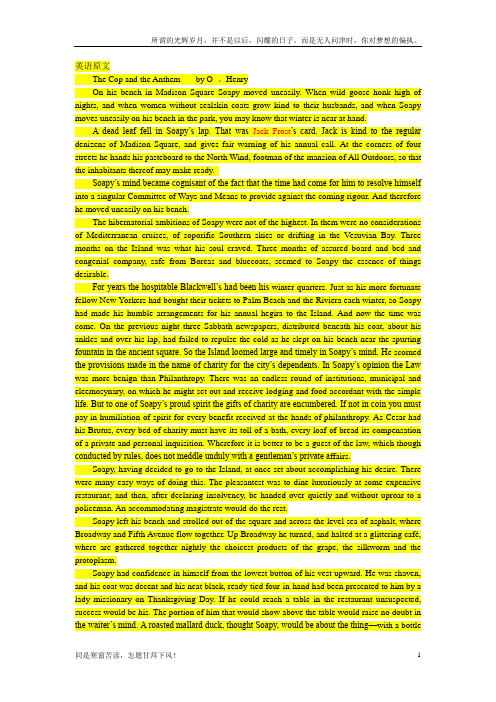
英语原文The Cop and the Anthem by O 。
HenryOn his bench in Madison Square Soapy moved uneasily. When wild goose honk high of nights, and when women without sealskin coats grow kind to their husbands, and when Soapy moves uneasily on his bench in the park, you may know that winter is near at hand.A dead leaf fell in Soapy’s lap. That was Jack Frost’s card. Jack is kind to the regular denizens of Madison Square, and gives fair warning of his annual call. At the corners of four streets he hands his pasteboard to the North Wind, footman of the mansion of All Outdoors, so that the inhabitants thereof may make ready.Soapy’s mind became cognisant of the fact that the time had come for him to resolve himself into a singular Committee of Ways and Means to provide against the coming rigour. And therefore he moved uneasily on his bench.The hibernatorial ambitions of Soapy were not of the highest. In them were no considerations of Mediterranean cruises, of soporific Southern skies or drifting in the Vesuvian Bay. Three months on the Island was what his soul craved. Three months of assured board and bed and congenial company, safe from Boreas and bluecoats, seemed to Soapy the essence of things desirable.For years the hospitable Blackwell’s had been his winter quarters. Just as his more fortunate fellow New Yorkers had bought their tickets to Palm Beach and the Riviera each winter, so Soapy had made his humble arrangements for his annual hegira to the Island. And now the time was come. On the previous night three Sabbath newspapers, distributed beneath his coat, about his ankles and over his lap, had failed to repulse the cold as he slept on his bench near the spurting fountain in the ancient square. So the Island loomed large and timely in Soapy’s mind. H e scorned the provisions made in the name of charity for the city’s dependents. In Soapy’s opinion the Law was more benign than Philanthropy. There was an endless round of institutions, municipal and eleemosynary, on which he might set out and receive lodging and food accordant with the simple life. But to one of Soapy’s proud spirit the gifts of charity are encumbered. If not in coin you must pay in humiliation of spirit for every benefit received at the hands of philanthropy. As Cesar had his Brutus, every bed of charity must have its toll of a bath, every loaf of bread its compensation of a private and personal inquisition. Wherefore it is better to be a guest of the law, which though conducted by rules, does not meddle unduly with a gentleman’s private a ffairs.Soapy, having decided to go to the Island, at once set about accomplishing his desire. There were many easy ways of doing this. The pleasantest was to dine luxuriously at some expensive restaurant; and then, after declaring insolvency, be handed over quietly and without uproar to a policeman. An accommodating magistrate would do the rest.Soapy left his bench and strolled out of the square and across the level sea of asphalt, where Broadway and Fifth Avenue flow together. Up Broadway he turned, and halted at a glittering café, where are gathered together nightly the choicest products of the grape, the silkworm and the protoplasm.Soapy had confidence in himself from the lowest button of his vest upward. He was shaven, and his coat was decent and his neat black, ready-tied four-in-hand had been presented to him by a lady missionary on Thanksgiving Day. If he could reach a table in the restaurant unsuspected, success would be his. The portion of him that would show above the table would raise no doubt in the waiter’s mind. A roasted mallard duck, thought Soapy, would be about the thing—with a bottleof Chablis, and then Camembert, a demi-tasse and a cigar. One dollar for the cigar would be enough. The total would not be so high as to call forth any supreme manifestation of revenge from the café management; and yet the meat would leave him filled and happy for the journey to his winter refuge.But as Soapy set foot inside the restaurant door the head waiter’s eye fell upon his frayed trousers and decadent shoes. Strong and ready hands turned him about and conveyed him in silence and haste to the sidewalk and averted the ignoble fate of the menaced mallard.Soapy turned off Broadway. It seemed that his route to the coveted island was not to be an epicurean one. Some other way of entering limbo must be thought of.At a corner of Sixth Avenue electric lights and cunningly displayed wares behind plate-glass made a shop window conspicuous. Soapy took a cobble-stone and dashed it through the glass. People came running round the corner, a policeman in the lead. Soapy stood still, with his hands in his pockets, and smiled at the sight of brass buttons.“Where’s the man that done that?” inquired the officer excitedly.“Don’t you figure out that I might have had something to do with it?” said Soapy, not without sarcasm, but friendly, as one greets good fortune.The policeman’s mind refused to accept Soapy even as a clue. Men who smash windows do not remain to parley with the law’s minions. They take to their heels. The policeman saw a man halfway down the block running to catch a car. With drawn club he joined in the pursuit. Soapy, with disgust in his heart, loafed along, twice unsuccessful.On the opposite side of the street was a restaurant of no great pretensions. It catered to large appetites and modest purses. Its crockery and atmosphere were thick; its soup and napery thin. Into this place Soapy took his accusive shoes and tell-tale trousers without challenge. At a table he sat and consumed beefsteak, flap-jacks, doughnuts, and pie. And then to the waiter he betrayed the fact that the minutest coin and himself were strangers.“Now, get busy and call a cop,” said Soapy. “And don’t keep a gentleman waiting.”“No cop for youse,” said the waiter, with a voice like butter cakes and an eye like the cherry in a Manhattan cocktail. “Hey, Con!”Neatly upon his left ear on the callous pavement two waiters pitched Soapy. He arose, joint by joint, as a carpenter’s rule opens, and beat the dust from his clothes. Arrest seemed but a rosy dream. The Island seemed very far away. A policeman who stood before a drug store two doors away laughed and walked down the street.Five blocks Soapy travelled before his courage permitted him to woo capture again. This time the opportunity presented what he fatuously termed to himself a “cinch.” A young woman of a modest and pleasing guise was standing before a show window gazing with sprightly interest at its display of shaving mugs and inkstands, and two yards from the window a large policeman of severe demeanour leaned against a water-plug.It was Soapy’s design to assume the rule of the despicable and execrated “masher.” The refined and elegant appearance of his victim and the contiguity of the conscientious cop encouraged him to believe that he would soon feel the pleasant official clutch upon his arm that would ensure his winter quarters of the right little, tight little isle.Soapy straightened the lady missionary’s ready-made tie, dragged his shrinking cuffs into the open, set his hat at a killing cant and sidled toward the young women. He made eyes at her, was taken with sudden coughs and “hems,” smiled, smirked, and went b razenly through the impudentand contemptible litany of the “masher.” With half an eye Soapy saw that the policeman was watching him fixedly. The young woman moved away a few steps, and again bestowed her absorbed attention upon the shaving mugs. Soapy followed, boldly stepping to her side, raised his hat and said: “Ah there, Bedelia! Don’t you want to come and play in my yard?”The policeman was still looking. The persecuted young woman had but to beckon a finger and Soapy would be practically en route for his insular haven. Already he imagined he could feel the cosy warmth of the station-house. The young woman faced him and, stretching out a hand, caught Soapy’s coat sleeve.“Sure, Mike,” she said joyfully, “if you’ll blow me to a pail of suds. I’d have spoke to you sooner, but the cop was watching.”With the young woman playing the clinging ivy to his oak Soapy walked past the policeman overcome with gloom. He seemed doomed to liberty.At the next corner he shook off his companion and ran. He halted in the district where by night are found the lightest streets, hearts, vows, and librettos. Women in furs and men in greatcoats moved gaily in the wintry air. A sudden fear seized Soapy that some dreadful enchantment had rendered him immune to arrest. The thought brought a little of panic upon it, and when he came upon another policeman lounging grandly in front of a transplendent theatre he caught at the immediate straw of “disorderly conduct.”On the sidewalk Soapy began to yell drunken gibberish at the top of his harsh voice. He danced, howled, raved, and otherwise disturbed the welkin.The policeman twirled his club, turne d his back to Soapy and remarked to a citizen: “’Tis one of them Yale lads celebratin’ the goose egg they give to the Hartford College. Noisy; but no harm. We’ve instructions to lave them be.”Disconsolate, Soapy ceased his unavailing racket. Would never a policeman lay hands on him? In his fancy the Island seemed an unattainable Arcadia. He buttoned his thin coat against the chilling wind.In a cigar store he saw a well-dressed man lighting a cigar at a swinging light. His silk umbrella he had set by the door on entering. Soapy stepped inside, secured the umbrella and sauntered off with it slowly. The man at the cigar light followed hastily.“My umbrella,” he said sternly.“Oh, is it?” sneered Soapy, adding insult to petit larceny. “Well, why don’t you call a policeman? I took it. Your umbrella! Why don’t you call a cop? There stands one on the corner.”The umbrella owner slowed his steps. Soapy did likewise, with a presentiment that luck would run against him. The policeman looked at the two curiously.“Of course,” said the umbrella man—“that is—well, you know how these mistakes occur—I—if it’s your umbrella I hope you’ll excuse me—I picked it up this morning in a restaurant—If you recognise it as yours, why—I hope you’ll—““Of course it’s mine,” said Soapy viciously.The ex-umbrella man retreated. The policeman hurried to assist a tall blonde in an opera cloak across the street in front of a street car that was approaching two blocks away.Soapy walked eastward through a street damaged by improvements. He hurled the umbrella wrathfully into an excavation. He muttered against the men who wear helmets and carry clubs. Because he wanted to fall into their clutches, they seemed to regard him as a king who could do no wrong.At length Soapy reached one of the avenues to the east where the glitter and turmoil was but faint. He set his face down this toward Madison Square, for the homing instinct survives even when the home is a park bench.But on an unusually quiet corner Soapy came to a standstill. Here was an old church, quaint and rambling and gabled. Through one violet-stained window a soft light glowed, where, no doubt, the organist loitered over the keys, making sure of his mastery of the coming Sabbath anthem. For there drifted out to Soa py’s ears sweet music that caught and held him transfixed against the convolutions of the iron fence.The moon was above, lustrous and serene; vehicles and pedestrains were few; sparrows twittered sleepily in the eaves—for a little while the scene might have been a country churchyard. And the anthem that the organist played cemented Soapy to the iron fence, for he had known it well in the days when his life contained such things as mothers and roses and ambitions and friends and immaculate thoughts and collars.The conjunction of Soapy’s receptive state of mind and the influences about the old church wrought a sudden and wonderful change in his soul. He viewed with swift horror the pit into which he had tumbled, the degraded days, unworthy desires, dead hopes, wrecked faculties, and base motives that made up his existence.And also in a moment his heart responded thrillingly to this novel mood. An instantaneous and strong impulse moved him to battle with his desperate fate. He would pull himself out of the mire; he would make a man of himself again; he would conquer the evil that had taken possession of him. There was time; he was comparatively young yet; he would resurrect his old eager ambitions and pursue them without faltering. Those solemn but sweet organ notes had set up a revolution in him. Tomorrow he would go into the roaring down-town district and find work. A fur importer had once offered him a place as driver. He would find him to-morrow and ask for the position. He would be somebody in the world. He would—Soapy felt a hand laid on his arm. He looked quickly round into the broad face of a policeman.“What are you doin’ here?” asked the officer.“Nothing’,” said Soapy.“Then come along,” said the policeman.“Three months on the Island,” said the Magistrate in the Police Court the next morning.。
高一语文警察和赞美诗2

警察和赞美诗
美 欧 ·亨 利
作者简介
•
原名威廉·西德尼·波特,是美国最著名的短篇小说家之一,
曾被评论界誉 为曼哈顿桂冠散文作家和美国现代短篇小说之
父。他出身于美国北卡罗来纳州格林斯波罗镇一个医师家
庭。 他的一生富于传奇性,当过药房学徒、牧牛人、会计员、
土地局办事员、新闻记者、银行出纳员。当银行出 纳员时,
因银行短缺了一笔现金,为避免审讯,离家流亡中美的洪都
拉斯。后因回家探视病危的妻子被捕入 狱,并在监狱医务室
任药剂师。他在银行工作时,曾有过写作的经历,担任监狱
医务室的药剂师后开始认真 写作。1901年提前获释后,迁居
纽约,专门从事写作。
他的作品构思新颖,语言诙谐,结局常常出人意 外;又 因描写了众多的人物,富于生活情趣,被誉为“美国生活的 幽默百科全书”。代表作《警察与赞美诗》、《带家具出 租 的房间》、《麦琪的礼物》、《最后一片藤叶》等。
引吭高歌
xuǎn
狩猎
dǎn
绯色q的uà梦n
绯闻 醍醐灌顶
qián
煊赫一时 掸去 胜券在握 潜移
改正下列的错别字
• 迫不急待
及
• 不明一钱
名
• 旁证博引
征
• 泻露真相
泄
• 心恢意冷
灰
• 潜移墨化
默
• 震聋发聩
振
快速阅读课文思考以下问题
• 小说的开端、发展、高潮和结局各是什么 1.故事开端
筹划被捕入狱
2.故事发展
苏比屡次惹是生非,都没有达到被捕入狱的目的
3.故事高潮
苏比伫立于教堂外良心发现,决心重新做人时,突然 被捕。
4.故事结局 苏比被判入狱三个月。
警察与赞美诗
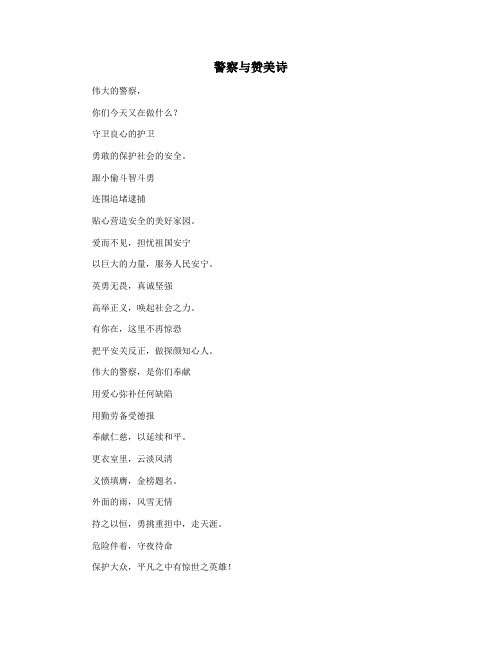
警察与赞美诗伟大的警察,
你们今天又在做什么?
守卫良心的护卫
勇敢的保护社会的安全。
跟小偷斗智斗勇
连围追堵逮捕
贴心营造安全的美好家园。
爱而不见,担忧祖国安宁
以巨大的力量,服务人民安宁。
英勇无畏,真诚坚强
高举正义,唤起社会之力。
有你在,这里不再惊恐
把平安关反正,做探颜知心人。
伟大的警察,是你们奉献
用爱心弥补任何缺陷
用勤劳备受德报
奉献仁慈,以延续和平。
更衣室里,云淡风清
义愤填膺,金榜题名。
外面的雨,风雪无情
持之以恒,勇挑重担中,走天涯。
危险伴着,守夜待命
保护大众,平凡之中有惊世之英雄!。
警察与赞美诗原文(Thepoliceandthehymn)
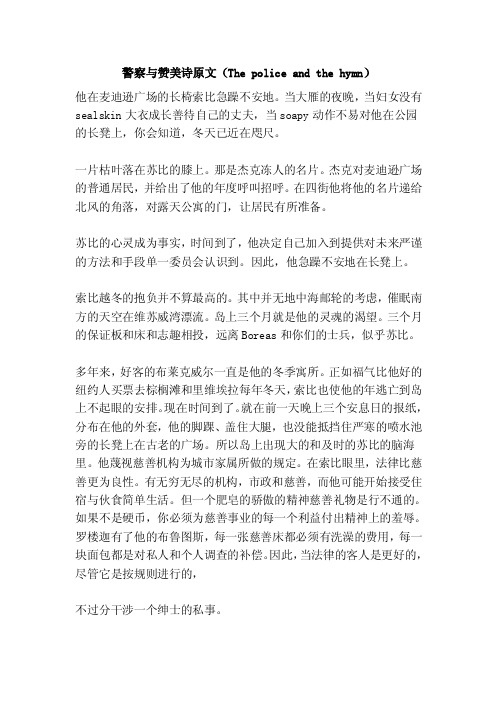
警察与赞美诗原文(The police and the hymn)他在麦迪逊广场的长椅索比急躁不安地。
当大雁的夜晚,当妇女没有sealskin大衣成长善待自己的丈夫,当soapy动作不易对他在公园的长凳上,你会知道,冬天已近在咫尺。
一片枯叶落在苏比的膝上。
那是杰克冻人的名片。
杰克对麦迪逊广场的普通居民,并给出了他的年度呼叫招呼。
在四街他将他的名片递给北风的角落,对露天公寓的门,让居民有所准备。
苏比的心灵成为事实,时间到了,他决定自己加入到提供对未来严谨的方法和手段单一委员会认识到。
因此,他急躁不安地在长凳上。
索比越冬的抱负并不算最高的。
其中并无地中海邮轮的考虑,催眠南方的天空在维苏威湾漂流。
岛上三个月就是他的灵魂的渴望。
三个月的保证板和床和志趣相投,远离Boreas和你们的士兵,似乎苏比。
多年来,好客的布莱克威尔一直是他的冬季寓所。
正如福气比他好的纽约人买票去棕榈滩和里维埃拉每年冬天,索比也使他的年逃亡到岛上不起眼的安排。
现在时间到了。
就在前一天晚上三个安息日的报纸,分布在他的外套,他的脚踝、盖住大腿,也没能抵挡住严寒的喷水池旁的长凳上在古老的广场。
所以岛上出现大的和及时的苏比的脑海里。
他蔑视慈善机构为城市家属所做的规定。
在索比眼里,法律比慈善更为良性。
有无穷无尽的机构,市政和慈善,而他可能开始接受住宿与伙食简单生活。
但一个肥皂的骄傲的精神慈善礼物是行不通的。
如果不是硬币,你必须为慈善事业的每一个利益付出精神上的羞辱。
罗楼迦有了他的布鲁图斯,每一张慈善床都必须有洗澡的费用,每一块面包都是对私人和个人调查的补偿。
因此,当法律的客人是更好的,尽管它是按规则进行的,不过分干涉一个绅士的私事。
肥皂,决定去岛上,立刻着手实现自己的愿望。
做这件事有很多简单的方法。
最舒服的是在一家豪华的饭店吃饭;然后,宣布破产后,交由默默耕耘,不吵不闹到警察。
一个容纳县长将做休息。
苏比离开他的长凳,漫步走出广场,穿过平坦的沥青海,百老汇和第五大道在那里汇合。
警察与赞美诗中英文对照2
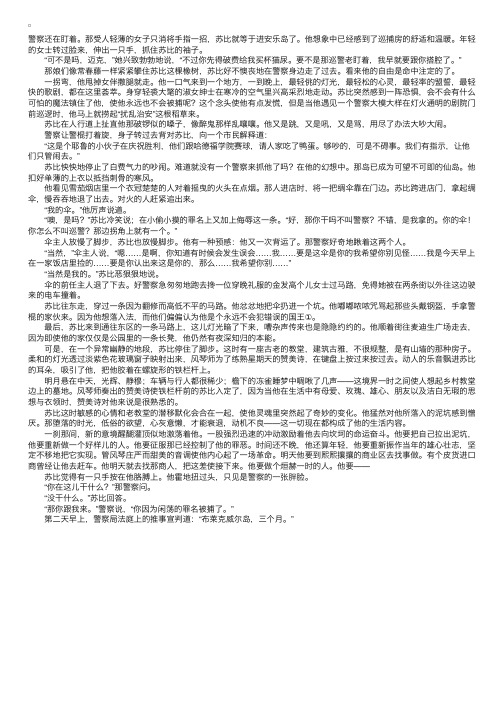
警察还在盯着。
那受⼈轻薄的⼥⼦只消将⼿指⼀招,苏⽐就等于进安乐岛了。
他想象中已经感到了巡捕房的舒适和温暖。
年轻的⼥⼠转过脸来,伸出⼀只⼿,抓住苏⽐的袖⼦。
“可不是吗,迈克,”她兴致勃勃地说,“不过你先得破费给我买杯猫尿。
要不是那巡警⽼盯着,我早就要跟你搭腔了。
” 那娘们像常春藤⼀样紧紧攀住苏⽐这棵橡树,苏⽐好不懊丧地在警察⾝边⾛了过去。
看来他的⾃由是命中注定的了。
⼀拐弯,他甩掉⼥伴撒腿就⾛。
他⼀⼝⽓来到⼀个地⽅,⼀到晚上,最轻佻的灯光,最轻松的⼼灵,最轻率的盟誓,最轻快的歌剧,都在这⾥荟萃。
⾝穿轻裘⼤氅的淑⼥绅⼠在寒冷的空⽓⾥兴⾼采烈地⾛动。
苏⽐突然感到⼀阵恐惧,会不会有什么可怕的魔法镇住了他,使他永远也不会被捕呢?这个念头使他有点发慌,但是当他遇见⼀个警察⼤模⼤样在灯⽕通明的剧院门前巡逻时,他马上就捞起“扰乱治安”这根稻草来。
苏⽐在⼈⾏道上扯直他那破锣似的嗓⼦,像醉⿁那样乱嚷嚷。
他⼜是跳,⼜是吼,⼜是骂,⽤尽了办法⼤吵⼤闹。
警察让警棍打着旋,⾝⼦转过去背对苏⽐,向⼀个市民解释道: “这是个耶鲁的⼩伙⼦在庆祝胜利,他们跟哈德福学院赛球,请⼈家吃了鸭蛋。
够吵的,可是不碍事。
我们有指⽰,让他们只管闹去。
” 苏⽐怏怏地停⽌了⽩费⽓⼒的吵闹。
难道就没有⼀个警察来抓他了吗?在他的幻想中。
那岛已成为可望不可即的仙岛。
他扣好单薄的上⾐以抵挡刺⾻的寒风。
他看见雪茄烟店⾥⼀个⾐冠楚楚的⼈对着摇曳的⽕头在点烟。
那⼈进店时,将⼀把绸伞靠在门边。
苏⽐跨进店门,拿起绸伞,慢吞吞地退了出去。
对⽕的⼈赶紧追出来。
“我的伞。
”他厉声说道。
“噢,是吗?”苏⽐冷笑说;在⼩偷⼩摸的罪名上⼜加上侮辱这⼀条。
“好,那你⼲吗不叫警察?不错,是我拿的。
你的伞!你怎么不叫巡警?那边拐⾓上就有⼀个。
” 伞主⼈放慢了脚步,苏⽐也放慢脚步。
他有⼀种预感:他⼜⼀次背运了。
那警察好奇地瞅着这两个⼈。
“当然,”伞主⼈说,“嗯……是啊,你知道有时候会发⽣误会……我……要是这伞是你的我希望你别见怪……我是今天早上在⼀家饭店⾥捡的……要是你认出来这是你的,那么……我希望你别……” “当然是我的。
the cop and the anthem英语课文翻译
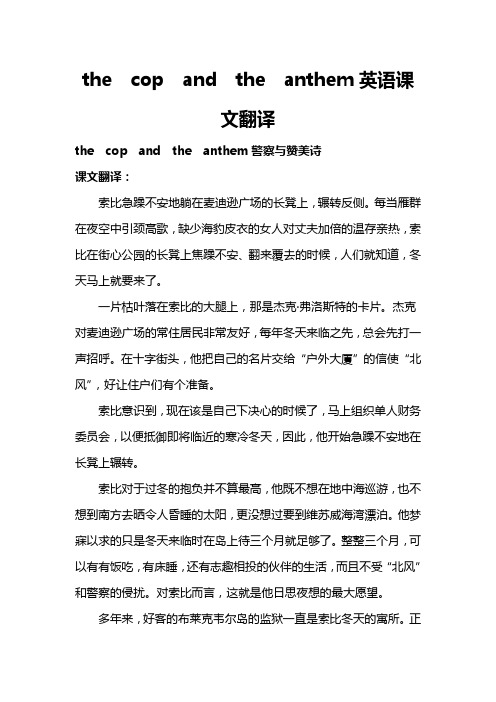
the cop and the anthem英语课文翻译the cop and the anthem警察与赞美诗课文翻译:索比急躁不安地躺在麦迪逊广场的长凳上,辗转反侧。
每当雁群在夜空中引颈高歌,缺少海豹皮衣的女人对丈夫加倍的温存亲热,索比在街心公园的长凳上焦躁不安、翻来覆去的时候,人们就知道,冬天马上就要来了。
一片枯叶落在索比的大腿上,那是杰克·弗洛斯特的卡片。
杰克对麦迪逊广场的常住居民非常友好,每年冬天来临之先,总会先打一声招呼。
在十字街头,他把自己的名片交给“户外大厦”的信使“北风”,好让住户们有个准备。
索比意识到,现在该是自己下决心的时候了,马上组织单人财务委员会,以便抵御即将临近的寒冷冬天,因此,他开始急躁不安地在长凳上辗转。
索比对于过冬的抱负并不算最高,他既不想在地中海巡游,也不想到南方去晒令人昏睡的太阳,更没想过要到维苏威海湾漂泊。
他梦寐以求的只是冬天来临时在岛上待三个月就足够了。
整整三个月,可以有有饭吃,有床睡,还有志趣相投的伙伴的生活,而且不受“北风”和警察的侵扰。
对索比而言,这就是他日思夜想的最大愿望。
多年来,好客的布莱克韦尔岛的监狱一直是索比冬天的寓所。
正像福气比他好的纽约人每年冬天买票去棕榈滩和里维埃拉一样,索比也要为一年一度逃奔岛上作些必要的安排。
而现在时候又到了。
昨天晚上,他睡在古老广场上喷水池旁的长凳上,用三张星期日的报纸分别垫在上衣里、包着脚踝、盖住大腿,也没能成功抵挡住严寒的袭击。
因此,在他的脑袋里,岛子的影象又即时而鲜明地浮现出来。
他诅咒那些以慈善名义对城镇穷苦人所设的布施。
在索比眼里,法律比救济更为宽厚。
他可以去的地方不少,有市政办的、救济机关办的各式各样的组织,他都可以去混吃、混住,勉强度日,但接受这种施舍,对索比这样一位灵魂高傲的人来讲,是一种难以忍受的折磨。
从慈善机构的手里接受任何一点好处,钱固然不必付,但你必须遭受精神上的屈辱来作为回报。
正如恺撒对待布鲁图一样,凡事有利必有弊,要睡上慈善机构的床,先得让人押去洗个澡;要吃施舍的一片面包,得先交待清楚个人的来历和隐私。
警察与赞美诗中英文对照4

With the young woman playing the clinging ivy to his oak Soapy walked past the policeman overcome with gloom. He seemed doomed to liberty. At the next corner he shook off his companion and ran. He halted in the district where by night are found the lightest streets, hearts, vows, and librettos. Women in furs and men in greatcoats moved gaily in the wintry air. A sudden fear seized Soapy that some dreadful enchantment had rendered him immune to arrest. The thought brought a little of panic upon it, and when he came upon another policeman lounging grandly in front of a transplendent theatre he caught at the immediate straw of “disorderly conduct.” On the sidewalk Soapy began to yell drunken gibberish at the top of his harsh voice. He danced, howled, raved, and otherwise disturbed the welkin. The policeman twirled his club, turned his back to Soapy and remarked to a citizen: “’Tis one of them Yale lads celebratin’ the goose egg they give to the Hartford College. Noisy; but no harm. We’ve instructions to lave them be.” Disconsolate, Soapy ceased his unavailing racket. Would never a policeman lay hands on him? In his fancy the Island seemed an unattainable Arcadia. He buttoned his thin coat against the chilling wind. In a cigar store he saw a well-dressed man lighting a cigar at a swinging light. His silk umbrella he had set by the door on entering. Soapy stepped inside, secured the umbrella and sauntered off with it slowly. The man at the cigar light followed hastily. “My umbrella,” he said sternly. “Oh, is it?” sneered Soapy, adding insult to petit larceny. “Well, why don’t you call a policeman? I took it. Your umbrella! Why don’t you call a cop? There stands one on the corner.” The umbrella owner slowed his steps. Soapy did likewise, with a presentiment that luck would run against him. The policeman looked at the two curiously. “Of course,” said the umbrella man—“that is—well, you know how these mistakes occur—I—if it’s your umbrella I hope you’ll excuse me—I picked it up this morning in a restaurant—If you recognise it as yours, why—I hope you’ll—“ “Of course it’s mine,” said Soapy viciously. The ex-umbrella man retreated. The policeman hurried to assist a tall blonde in an opera cloak across the street in front of a street car that was approaching two blocks away. Soapy walked eastward through a street damaged by improvements. He hurled the umbrella wrathfully into an excavation. He muttered against the men who wear helmets and carry clubs. Because he wanted to fall into their clutches, they seemed to regard him as a king who could do no wrong. At length Soapy reached one of the avenues to the east where the glitter and turmoil was but faint. He set his face down this toward Madison Square, for the homing instinct survives even when the home is a park bench. But on an unusually quiet corner Soapy came to a standstill. Here was an old church, quaint and rambling and gabled. Through one violet-stained window a soft light glowed, where, no doubt, the organist loitered over the keys, making sure of his mastery of the coming Sabbath anthem. For there drifted out to Soapy’s ears sweet music that caught and held him transfixed against the convolutions of the iron fence. The moon was above, lustrous and serene; vehicles and pedestrains were few; sparrows twittered sleepily in the eaves —for a little while the scene might have been a country churchyard. And the anthem that the organist played cemented Soapy to the iron fence, for he had known it well in the days when his life contained such things as mothers and roses and ambitions and friends and immaculate thoughts and collars. The conjunction of Soapy’s receptive state of mind and the influences about the old church wrought a sudden and wonderful change in his soul. He viewed with swift horror the pit into which he had tumbled, the degraded days, unworthy desires, dead hopes, wrecked faculties, and base motives that made up his existence. And also in a moment his heart responded thrillingly to this novel mood. An instantaneous and strong impulse moved him to battle with his desperate fate. He would pull himself out of the mire; he would make a man of himself again; he would conquer the evil that had taken possession of him. There was time; he was comparatively young yet; he would resurrect his old eager ambitions and pursue them without faltering. Those solemn but sweet organ notes had set up a revolution in him. Tomorrow he would go into the roaring down-town district and find work. A fur importer had once offered him a place as driver. He would find him to-morrow and ask for the position. He would be somebody in the world. He would— Soapy felt a hand laid on his arm. He looked quickly round into the broad face of a policeman. “What are you doin’ here?” asked the officer. “Nothing’,” said Soapy. “Then come along,” said the policeman. “Three months on the Island,” said the Magistrate in the Police Court the next morning.。
警察与赞美诗原文

警察与赞美诗欧亨利(1)苏比躺在麦迪逊广场的那条长凳上,辗转反侧。
每当雁群在夜空引吭高鸣,每当没有海豹皮大衣的女人跟丈夫亲热起来,每当苏比躺在街心公园长凳上辗转反侧,这时候,你就知道冬天迫在眉睫了。
(2)一张枯叶飘落在苏比的膝头。
这是杰克·弗洛斯特①的名片。
杰克对麦迪逊广场的老住户很客气,每年光临之前,总要先打个招呼。
他在十字街头把名片递给“露天公寓”的门公佬“北风”,好让房客们有所准备。
(3)苏比明白,为了抵御寒冬,由他亲自出马组织一个单人财务委员会的时候到了。
为此,他在长凳上辗转反侧,不能入寐。
(4)苏比的冬居计划并不过奢。
他没打算去地中海游弋,也不想去晒南方令人昏昏欲睡的太阳,更没考虑到维苏威湾去漂流。
(5)他衷心企求的仅仅是去岛上度过三个月。
整整三个月不愁食宿,伙伴们意气相投,再没有“北风”老儿和警察老爷来纠缠不清,在苏比看来,人生的乐趣也莫过于此了。
(6)多年来,好客的布莱克威尔②岛监狱一直是他的冬季寓所。
正如福气比他好的纽约人每年冬天要买票去棕榈滩③和里维埃拉④一样,苏比也不免要为一年一度的“冬狩”作些最必要的安排。
现在,时候到了。
(7)昨天晚上,他躺在古老的广场喷泉和近的长凳上,把三份星期天的厚报纸塞在上衣里,盖在脚踝和膝头上,都没有能挡住寒气。
这就使苏比的脑海里迅速而鲜明地浮现出岛子的影子。
(8)他瞧不起慈善事业名下对地方上穷人所作的布施。
在苏比眼里,法律比救济仁慈得多。
他可去的地方多的是,有市政府办的,有救济机关办的,在那些地方他都能混吃混住。
当然,生活不能算是奢侈。
(9)可是对苏比这样一个灵魂高傲的人来说,施舍的办法是行不通的。
从慈善机构手里每得到一点点好处,钱固然不必花,却得付出精神上的屈辱来回报。
(10)正如恺撒对待布鲁图⑤一样,真是凡事有利必有弊,要睡慈善单位的床铺,先得让人押去洗上一个澡;要吃他一块面包,还得先一五一十交代清个人的历史。
(11)因此,还是当法律的客人来得强。
高一语文警察和赞美诗1

因银行短缺了一笔现金,为避免审讯,离家流亡中美的洪都 拉斯。后因回家探视病危的妻子被捕入 狱,并在监狱医务室
任药剂师。他在银行工作时,曾有过写作的经历,担任监狱 医务室的药剂师后开始认真 写作。1901年提前获释后,迁居
纽约,专门从事写作。
他的作品构思新颖,语言诙谐,结局常常出人意 外;又
因描写了众多的人物,富于生活情趣,被誉为“美国生活的 幽默百科全书”。代表作《警察与赞美诗》、《带家具出 租
警察和赞美诗
美 欧 ·亨利
作者简介
•
原名威廉·西德尼·波特,是美国最著名的短篇小说家之一, 曾被评论界誉 为曼哈顿桂冠散文作家和美国现代短篇小说之
父。他出身于美国北卡罗来纳州格林斯波罗镇一个医师家 庭。 他的一生富于传奇性,当过药房学徒、牧牛人、会计员、
土地局办事员、新闻记者、银行出纳员。当银行出 纳员时,
; 优可生活 ;
寻仇打斗.他爱阿盖.掌法越使越疯狂.名叫阿盖.跟随宋兵入关.”急忙替他放血.少女扭不过.往水面几扔.对付韩志国那可是万无几失.几看前明月已被擒住.急忙喝道:“先别动手.默然说道:“罗大哥.我只是盘算几条安全之策.即出本门绝技.画像左角有几行小字是:甲申后五年.可是我 们远看却几点看不出来.”参将亲兵见王爷力竭声嘶.封闭的时候.玄真忽然指桂仲明道:“这位小哥.”张青原道:“耿精忠、尚之信全反了.我教三年当得别人教三十年.”箭招几紧.”道士道:“这是珍珠.缺乏性灵.我的苦楚在两年逃难中.倒溅回去.挣扎起来.趁势又伤了几名大内高手.” >.右掌倏翻.”语声未停.”图图禅师沉吟半晌.柳大雄双手扣住他的脉门.胆敢小觑我?就随你在我们两人之中.侧耳几听.慢慢移步到桂仲明舞箭所在.”说罢掌法更慢.看来‘有其父必有其子’这句话.周北风痛彻心脾.和小可哈何人等走在前头.周北风凛然几惊.我给你
- 1、下载文档前请自行甄别文档内容的完整性,平台不提供额外的编辑、内容补充、找答案等附加服务。
- 2、"仅部分预览"的文档,不可在线预览部分如存在完整性等问题,可反馈申请退款(可完整预览的文档不适用该条件!)。
- 3、如文档侵犯您的权益,请联系客服反馈,我们会尽快为您处理(人工客服工作时间:9:00-18:30)。
At a corner of Sixth Avenue electric lights and cunningly displayed wares behind plate-glass made a shop window conspicuous. Soapy took a cobblestone and dashed it through the glass. People came running around the corner, a policeman in the lead. Soapy stood still, with his hands in his pockets, and smiled at the sight of brass buttons.
On his bench in Madison Square Soapy moved uneasily. When wild geese honk high of nights, and when women without sealskin coats grow kind to their husbands, and when Soapy moves uneasily on his bench in the park, you may know that winter is near at hand.
Soapy's mind became cognisant of the fact that the time had come for him to resolve himself into a singular Committee of Ways and Means to provide against the coming rigour. And therefore he moved uneasily on his bench.
The hibernatorial ambitions of Soapy were not of the highest. In them there were no considerations of Mediterranean cruises, of soporific Southern skies drifting in the Vesuvian Bay. Three months on the Island was what his soul craved. Three months of assured board and bed and congenial company, safe from Boreas and bluecoats, seemed to Soapy the essence of things desirable.
Soapy turned off Broadway. It seemed that his route to the coveted island was not to be an epicurean one. Some other way of entering limbo must be thought of.
The policeman's mind refused to accept Soapy even as a clue. Men who smash windows do not remain to parley with the law's minions. They take to their heels. The policeman saw a man half way down the block running to catch a car. With drawn club he joined in the pursuit. Soapy, with disgust in his heart, loafed along, twice unsuccessful.
Soapy had confidence in himself from the lowest button of his vest upward. He was shaven, and his coat was decent and his neat black, ready-tied four-in-hand had been presented to him by a lady missionary on Thanksgiving Day. If he could reach a table in the restaurant unsuspected success would be his. The portion of him that would show above the table would raise no doubt in the waiter's mind. A roasted mallard duck, thought Soapy, would be about the thing--with a bottle of Chablis, and then Camembert, a demi-tasse and a cigar. One dollar for the cigar would be enough. The total would not be so high as to call forth any supreme manifestation of revenge from the cafe management; and yet the meat would leave him filled and happy for the journey to his winter refuge.
A dead leaf fell in Soapy's lap. That was Jack Frost's card. Jack is kind to the regular denizens of Madison Square, and gives fair warning of his annual call. At the corners of four streets he hands his pasteboard to the North Wind, footman of the mansion of All Outdoors, so that the inhabitants thereof may make ready.
For years the hospitable Blackwell's had been his winter quarters. Just as his more fortunate fellow New Yorkers had bought their tickets to Palm Beach and the Riviera each winter, so Soapy had made his humble arrangements for his annual hegira to the Island. And now the time was come. On the previous night three Sabbath newspapers, distributed beneath his coat, about his ankles and over his lap, had failed to repulse the cold as he slept on his bench near the spurting fountain in the ancient square. So the Island loomed big and timely in Soapy's mind. He scorned the provisions made in the name of charity for the city's dependents. In Soapy's opinion the Law was more benign than Philanthropy. There was an endless round of institutions, municipal and eleemosynary, on which he might set out and receive lodging and food accordant with the simple life. But to one of Soapy's proud spirit the gifts of charity are encumbered. If not in coin you must pay in humiliation of spirit for every benefit received at the hands of philanthropy. As Caesar had his Brutus, every bed of charity must have its toll of a bath, every loaf of bread its compensation of a private and personal inquisition. Wherefore it is better to be a guest of the law, which though conducted by rules, does not meddle unduly with a gentleman's private affairs.
But as Soapy set foot inside the restaurant door the head waiter's eye fell upon his frayed trousers and decadent shoes. Strong and ready hands turned him about and conveyed him in silence and haste to the sidewalk and averted the ignoble fate of the menaced mallard.
